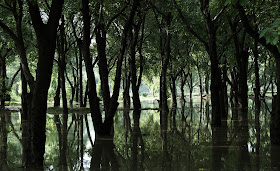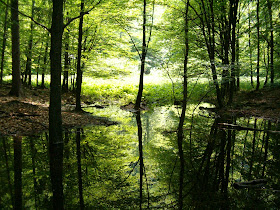A swamp is a wetland with some flooding of large areas of land by shallow bodies of water. A swamp generally has a large number of hammocks, or dry-land protrusions, covered by aquatic vegetation, or vegetation that tolerates periodical inundation. The two main types of swamp are "true" or swamp forests and "transitional" or shrub swamps. The water of a swamp may be fresh water, brackish water or seawater.
In North America, swamps are usually regarded as including a large amount of woody vegetation, but elsewhere this may not necessarily apply, such as in African swamps dominated by papyrus. By contrast, a marsh in North America is a wetland without woody vegetation, or elsewhere, a wetland without woody vegetation which is shallower and has less open water surface than a swamp. A mire (or quagmire) is a low-lying wetland of deep, soft soil or mud that sinks underfoot with large algae covering the water's surface.











No comments:
Post a Comment